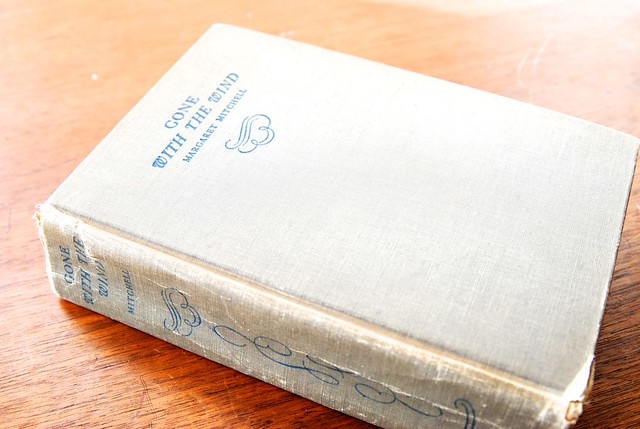First of all, I was highly impressed by how many of you actually read the last post and commented. It was a feisty party in the comment section, and I liked it! Thanks for the healthy banter.
Now, I needed a break from heavy books. I needed to go back to my roots…{I didn’t mean to write a second book review in a row. Sometimes, I just get away from myself. If you’d like to skip down to where the book review ends and the title of this post begins, I’ll put some big bold letters that tell you where to start reading}
And you can’t go much farther back than Gone with the Wind by Margaret Mitchell. It’s one I’ve been meaning to read for a while, even though friends warned me it was no outstanding piece of literature, I couldn’t help but hold a curiosity for “the land of cotton” as it was.
Much as I experienced with Augusta Evans-Wilson, I was delighted to read Mitchell’s well-penned descriptions of the red-clay fields, ancient towering pine trees, and rows of rich white cotton. As a self-proclaimed Irishwoman, I empathized with Gerald and Scarlett O’Hara and found myself longing to go home and sink my hands into native soil:
Yet the serene half-light over Tara’s well-kept acres brought a measure of quiet to her disturbed mind. She loved this land so much, without even knowing she loved it, loved it as she loved her mother’s face under the lamp at prayer time….
“Land is the only thing in the world that amounts to anything,” [Gerald] shouted, his thick short arms making wide gestures of indignation, “for ’tis the only thing in this world that lasts, and don’t you be forgetting it! ‘Tis the only thing worth working for–worth dying for.”
I was also amazed by Mitchell’s gift of capturing dialects. From the Charlestonians “drawling flat voices,” to the “brisk voices of upland Georgia,” to Gerald’s Irish brogue, and–most especially–the hilarious diction of the plantation workers, Mitchell captured them all.
I was mesmerized by the characters of Scarlett O’Hara and Rhett Butler. To have a hero and heroine who are at once villains and lovable creatures (to be pitied) was an exhilarating read. I could identify with Scarlett one minute and want to wring her pretty little neck the next. I could hope she’d stay good to her word and never speak to “that wretched Butler man” again on one page and be longing for Rhett’s sarcastic humor and proffered protection on the next page.
I’m not sure why I read two thousand-plus page books in a row, but I find it ironic that both of these tomes, while utterly different in writing style and subject matter, both contain a main character who is a female that would be considered a staunch Objectivist (to use Ayn Rand’s term). While any of you Libertarians who are still following from the last blog may balk at the thought of Scarlett O’Hara being compared to Dagny Taggart, Scarlett certainly falls under the premise that: the proper moral purpose of one’s life is the pursuit of one’s own happiness or rational self-interest, that the only social system consistent with this morality is full respect for individual rights, embodied in laissez faire capitalism… [Source] Have you read the second half of Gone with the Wind? After her famous decision, “…as God is my witness, I’m never going to be hungry again,” she raises a cotton plantation up from nothing, marries her sister’s beau in order to get the tax money to save Tara from the Carpetbaggers, manages the affairs of her new husband’s store with an iron fist, and starts TWO lumber companies on her own–against her family’s utter disgust at the impropriety of her actions. Sound familiar to Dagny?
There are two primary differences between the two characters, however. Scarlett called the pursuit of her own happiness, selfishness. While Scarlett O’Hara embraced and lived by a code of selfishness, she did not give it the noble standing of a virtue (the supreme virtue) as did Dagny Taggart. The second difference is that Scarlett was, in every manner possible, feminine and used her charms for her own selfish gain. Dagny, while lusty, was certainly not feminine and Scarlett would’ve probably chided her for abstaining from the use of, what she considered, a great asset.
It was disconcerting to read a description of the Civil War from the viewpoint of a southerner and slave owner (and to hear the slang terms the slaves were called, tossed casually around!). While none of us (including Mitchell, I believe) would argue that slave ownership was right, she does portray the reasons why the South thought it permissible and necessary at the time. To “own” another person is abuse in and of itself, but Mitchell seems to believe that the physical abuse of slaves was the exception much more than the norm. Tales of slaves being chased by blood hounds, or beaten, or murdered are scoffed at in the novel and depicted as Yankee propaganda. Instead, most of the slaves are portrayed as part of the family, cared for in their sickness by the women of the house and loved as extended family members. I don’t know if Uncle Tom’s Cabin or Gone with the Wind is the more accurate depiction of how the times actually were. Certainly, the South is the better from being forced from the practice of slavery. However, it is intriguing to consider the mind-sets of both points of view.
While I don’t plan to buy a Confederate flag to fly in my yard, and I don’t plan to encourage Jeremiah to join in on the Civil War battle re-enactments that are still being staged in some small towns back home, I do have a better understanding of where these deep feelings come from. Reconstruction was horrible. Truly horrendous, and Southerners are a proud and unforgiving race. If my Grandma had told me stories of Yankees burning her house to the ground, stealing her food and little money, and leaving her family to starve, I might set a rigid jaw at the thought of the “damn Yankees” too.
Start here to read the non-book-review part of the blog
But do you see the title of this blog? I wasn’t planning to write about any of that. I was planning to write a fun commentary on how Southern women are still being raised to attract men in much the same way as they were 150 years ago. I don’t ever remember my Mom speaking words as clearly as Scarlett’s Mammy, but somehow she conveyed the message just the same:
“I wish to Heaven I was married,” [Scarlett] said resentfully as she attacked the yams with loathing. “I’m tired of everlastingly being unnatural and never doing anything I want to do. I’m tired of acting like I don’t eat more than a bird, and walking when I want to run and saying I feel faint after a waltz, when I could dance for two days and never get tired. I’m tired of saying, ‘How wonderful you are!’ to fool men who haven’t got one-half the sense I’ve got, and I’m tired of pretending I don’t know anything, so men can tell me things and feel important while they’re doing it….I can’t eat another bite.”
“Try a hot cake,” said Mammy inexorably.
“Why is it a girl has to be silly to catch a husband?”
“Ah specs it’s kase gempmums doan know whut dey wants. Dey jes’ knows whut dey thinks dey wants. An’ givin’ dem whut dey thinks dey wants saves a pile of mizry an’ bein a ole maid. ‘An dey thinks dey wants mousy lil gals wid bird’s tastes an’ no sense at all. It doan make a gempmum feel like mahyin’ a lady ef he suspicions she got mo’ sense dan he has.”
“Don’t you suppose men get surprised after they’re married to find that their wives do have sense?”
“Well, it’s too late den. Dey’s already mahied. ‘Sides, gempmums specs dey wives ter have sense.”…
“I don’t think Yankee girls have to act like such fools. When we were at Saratoga last year, I noticed plenty of them acting like they had right good sense and in front of men, too.”
Mammy snorted. “Yankee gals! Yas’m, Ah guess dey speaks dey minds awright, but Ah ain’ noticed many of den gittin’ proposed ter at Saratoga.”
Fall of my Freshman year at Auburn. Jeremiah and I were broken up (so that I could have my “Freshman year experience”), and I was out from under my mother’s helpful hand (insert watchful eye, asking me if I “had on any lipstick? What about blush?”) and left to attempt dating on my own for the first time. She hadn’t taught me so much by word (although there were some words) as by example. I think my mother courted every boy that ever courted me, only with more skill. I can still see her sitting at our kitchen table, batting her eyelashes at the boy I was supposed to be dating and asking him about every little thing under the sun. Drawing him out to see what made him feel special, complimenting him with giggles that made me want to roll my eyes–because she knew I couldn’t do it quite like she could. I know, in her mind, none of us (I have three little sisiters) would have ever had a second date if she hadn’t made the current boy fall in love with us.
But now, I was away at school and on my own. Mom wasn’t here to faun all over the boys for me, I had to do it myself–if I didn’t want to be the only girl at Auburn without a date to a football game. I remember riding down the elevators in Sasnett dorm, dreading the moment when those elevator doors would open and reveal the lobby. My date would be standing there, the lights would be on me….
I’m proud to say, I did it. All those days spent in the kitchen learning from my Mom paid off. I knew how to make a guy feel like he was the center of my universe, with not so much as a peck on the cheek. I drew them out, didn’t talk about myself, laughed at the jokes they made, and filled any and every awkward silence with quips of my own…and then came back to the dorm after those long days of tailgating, cheering, and doting feeling like I’d been doing a tap-dance act for hours straight. I didn’t drink back then either…in retrospect I kind of wish I had 🙂
Not every Southern girl follows these rules for dating. One of my dear friends and roommates at Auburn was one who did not. Her nickname was “Barbie,” and there was good reason for it. I quickly learned not to set “Barbie” up with anybody, because she didn’t play by the rules. If she didn’t like her date–if he bored her, if he wasn’t as cute as she was expecting–she was silent and aloof, fine to leave him with his awkward silences and flailing manhood. I was present at more than one of these massacres (that she was pretty enough to pull off) and always felt the need to do an extra tap dance for her date. Barbie would laugh at me and my exhausted state later that night, when were safely back home, but the training was too entrenched, I couldn’t bear to watch a guy think he was less than special on my watch–even if he wasn’t my date.
And then there is that whole idea of feminine weakness. I think that this point is not quite as cut-and-dry as it was in Scarlett’s day. Today, I think men want to know there’s a hint of fearlessness in a lady…just not so much that she would ever dream of competing with him in any way. Some examples of my interpretation of this are as follows: On nighttime walks through the woods, it is always better to ask for an arm to lead you–after all you might trip and fall without his help, right? Four-wheelers are manly machinery, it is much better to cling to your man for dear life than to drive your own. While you need a hint of fearlessness on horseback–a willingness to follow him on every adventure and a strong seat in your saddle–I don’t think there’s ever a need to saddle your own horse. And when walking down the sidewalk on the way to a football game, go ahead and let him walk on the curbside and protect you from oncoming traffic. It’s makes them feel good…and it’s kind of comforting to be helpless in some areas.
I was so thankful for the dating to end. I still want to make my husband feel like the center of my universe, and I still try to practice selective helplessness, but I’m thankful that I’m now responsible for making only one man feel that way…at least until Pace and Mary Aplin start dating 🙂
I heard Jeremiah recently, talking to one of our single guy friends out here, trying to convince him that he needed to move to Alabama. Once he had gone through all the normal glories of Southern life I heard him switch to Southern women. You can believe my ears perked up as I casually added more cream to my pot of mashed potatoes.
“Girls are just different in the South,” Jeremiah said with conviction. “When I was dating Abby, I felt like a king. I’d walk into her house and her Mom was always cooking something she knew I’d like, and there were all these pretty girls just all around me. I don’t know, man, it was awesome. Out here, woman are just…harder.”
Lordey mercy! I dared not turn around for the boys to see the huge smile on my face. I hope my Mom could hear, right up there in heaven, that her hard work and daughter training had paid off.








I’m never disappointed in your posts. Reading this post, I couldn’t help but think to myself, “No wonder I’m 29 and still single! I’ve been going about this ‘dating’ thing all wrong!” I must try this “center of the universe,” “tap-dancing” approach. I would like to submit a request for more instruction on this topic for all your single, southern (or other) readers! 🙂
Did you go to Auburn in the 1800s? No offense.
I went to Alabama and I couldnt agree more. I love this post Abby!!!
Love it! All men NEED their good southern woman. So thankful to be in the SOUTH!!!
so funny…
i grew up in dothan, daughter of a true southern woman, and i picked up on NONE of this. but i watched it all around me baffled. unsure how or why it worked that way.
however, my sister embodies this southern tradition without flaw… and it is a dance indeed! and so fun and beautiful to watch..
my only 2 cents:
a southern girl can be beautiful both ways 🙂
I think that I would rather drive the 4 wheeler myself. 🙂
Abby,
I love how open and honest you are. You graduated from Auburn in 2004 right? 😉
Loved this post. YOU nailed it and, spoke the truth! The tap-dance thing took me years to get over! :O) I am blessed, so bless to be a” Southern Girl!!!! Keep on reading and keep on posting, Abby!!! Hmmmm…I said…”GIRL” seems that I still feel that way! LOL….
I loved this post. I whole-heartedly agree with you about southern courtships. When I was in high school and while at Auburn, I (and my mother) had the same experiences that you described. We are taught from a young age to be both tenacious and genteel. It’s a tough balance for many; however, for southern women it comes more naturally. After graduating with our Master’s, my husband and I moved straight from Auburn to Philadelphia, PA. When we lived there, I couldn’t help but notice that we (1) were the only ones out of our new northeastern peer group who were married and (2) that all of my northern girlfriends had a completely different concept to dating and life in general than I had.
i wish i was a southern gal from this post! thanks for sharing, abby! 🙂
Hey Abby,
This is Kelli from birmingham. I loved your post. I’m almost afraid to admit that “Gone With the Wind” is actually one of my favorite books!! I laughed out loud a few times reading your post. I think we have some of the same thoughts during our dating times! Totally agree! Hope y’all are doing well. We think about y’all in Sunday School a lot.
Let us not forget to pay homage to Margret Mitchell! The background story of this visionary is one to take note of . The book won a Pulitzer Prize , some feat for your “not outstanding piece of Literature” critics.
Abby,
I attended the University of Alabama in Tuscaloosa and can say that this post was absolutely spot-on. I was taught from a very young age that getting married and having children would be the biggest treasures in my life and college is where/when I was expected to meet my future husband. It is a bittersweet way of living, and I wouldn’t trade it for anything!
Is this post for real or is it tongue-in-cheek?
I’m a girl from the midwest. My parents always taught me to speak my mind, challenge myself/and my man, be beautiful, be strong, helplessness/weakness is not cute, educate yourself, get a job, fend for yourself…because life can be a turbulent ride. You never know what will happen with a man, but you always have yourself. Yep I love to cook, look pretty, take care of my family, but you can bet if he says or does something mornonic I’m not gonna stand around and giggle. And I’d like my own 4 wheeler please.
I’m happily married and I have never had a problem finding men. I’m not exceptionally gorgeous, but I have a good attitude and I’m myself. If we don’t click, we don’t click.
Teach your young girls to be strong and independent. That does not equate to being “hard.” I’ll let a man protect me if he wishes, but I will not feign weakness for his ego. Most men I know are annoyed by the dumb cutsey helpless girl…just in the north perhaps?
Who said anything about dumb or actually being helpless? Southern women are portrayed in literature and film as strong, resilient and capable…not to mention the fact that history has proved this to be true.
Abby mentioned “laughing at jokes and coming back with quips of her own”…..which takes skill and intelligence…..there is a big difference between being charming and witty versus sardonic.
Why is it in most stories the prince is always seeking to rescue the maiden? You just can’t fight DNA ladies. Like it or not, men want to be the hero.
If you try to deny some things, you might really be living in a fairy tale.
I know I’m super late to the party, but I just finished reading GWTW and decided to look for message boards that had a mutual disgust for Scarlett O’Hara. Somehow I found this.
Your assessment of a loving, kind rule of the Margaret Mitchell view on slavery is shocking. I am thinking Margaret Mitchell was a smart woman, so she must have had a clue that her description of slavery EASILY would created an opposite interpretation.
The narrator (this book was the rare occasion that the omniscient narrator shared her own opinion about matters) and Scarlett both believed that darkies were as silly as children, i.e., not intelligent enough to take care of themselves. Two niggers were killed for simply speaking out of turn to a white woman, by Rhett and by Tony Fontaine. And the narrator expected the reader to sympathize with them.
Scarlett thought the field hands ungrateful for immediately leaving after the Yankees won the war. Wouldn’t a reasonable person think, maybe, just maybe, the field hands WEREN’T as happy as Scarlett and the narrator led on? I mean come on, if they are as simple-minded as children, then they shouldn’t want to leave the safety of their slave homes.
From the sounds of this book, white people from the North and South did not consider niggers worthy. The South just loved them like a human loves their pets (often these niggers were described as pets), while the North thought them intimidating like apes. Both don’t consider niggers to be equal to them. They just respond differently.
I do believe Mitchell gave a much more candid and realistic view of what went on during slavery. But I’m astonished to learn that someone read this as saying it was pleasant for niggers.